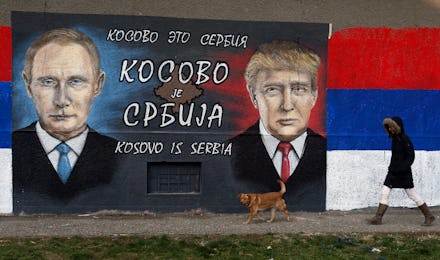Russian election hacks: Latest updates on CIA investigation

In October, the U.S. government formally announced its belief that the Russian government was behind the hack that resulted in the leak of emails from the Democratic National Committee and the Clinton campaign.
But last week, intelligence officials took it a step further, concluding that Russia was working to influence the results of the presidential election.
Members of Congress from both sides of the aisle have called for an investigation into the CIA conclusion, while the FBI and the Office of the Director of National Intelligence say they cannot yet prove intent on the part of the Russians.
The Clinton campaign has called for intelligence to be declassified, saying the CIA's claim "should distress every American."
Trump, meanwhile, dismissed the conclusion as "ridiculous."
"I don't believe that at all," Trump said on Fox News Sunday. "They have no idea if it's Russia or China or somebody. It could be somebody sitting in a bed some place. I mean they have no idea."
What we know about Russian interference
In July, just before the Democratic National Convention, WikiLeaks released close to 20,000 emails from the DNC and the Clinton campaign. The emails were a major news story during the race and may have increased the strain between the Clinton campaign and the more liberal wing of the party that supported Bernie Sanders.
In October, the Obama administration formally blamed Russia for the hacks. According to a joint statement from the Department of Homeland Security and the Office of the Director of National Intelligence, the hacks are "consistent with the methods and motivations of Russian-directed efforts."
"We believe, based on the scope and sensitivity of these efforts, that only Russia's senior-most officials could have authorized these activities," the statement read.
Trump and Clinton both received briefings about Russian interference during their campaigns. During the third presidential debate, Clinton accused Trump of being a puppet for Russian President Vladimir Putin, to which Trump replied, "No puppet. No puppet. You're the puppet."
According to CNN, the CIA is now concluding the hacks were meant to help Trump win the presidency following a more comprehensive analysis of intelligence, though, as NPR notes, much of that intelligence remains secret.
Calls for Obama to declassify intelligence
Members of the Electoral College are calling for an intelligence briefing on the Russian interference into the election before they officially pick the president Dec. 19.
In an open letter written by Christine Pelosi, daughter of Democratic House Leader Nancy Pelosi, and signed by a bipartisan group of electors, the members say they "require to know from the intelligence community whether there are ongoing investigations into ties between Donald Trump, his campaign or associates, and Russian government interference in the election, the scope of those investigations, how far those investigations may have reached, and who was involved in those investigations."
The Clinton campaign, while emphasizing that it conceded the election, has backed the group of electors and is calling on the Obama administration to declassify its information on the Russian intervention.
Harry Reid alleges Trump campaign involvement
On Monday, Senate Minority Leader Harry Reid told the Huffington Post that he has "no doubt" that there was "collusion" between the Trump campaign and the Russian government.
"Someone in the Trump campaign organization was in on the deal," Reid said. "I have no doubt."
The Trump team did not respond to Reid's specific allegation, and a WikiLeaks spokesperson denied it to the Huffington Post.
Though Reid does not cite any evidence for his claim, Trump's team includes several individuals with ties to Russia and that Trump has praised President Vladimir Putin in the past.
Intelligence officials have not indicated Trump's campaign was complicit in the hacks.
Trump's reaction
Donald Trump said on Sunday he does not believe the CIA conclusion and on Monday took to Twitter to liken it to a "conspiracy theory."
In an earlier statement, Trump's transition team called the CIA "the same people that said Saddam Hussein had weapons of mass destruction," raising the specter of conflict between the president-elect and the intelligence agencies he'll work with, as well as fellow Republicans.
There is not a consensus among the 17 agencies that make up the U.S. intelligence community, but the NSA, the largest U.S. intelligence service, seems to back the CIA's recent findings.